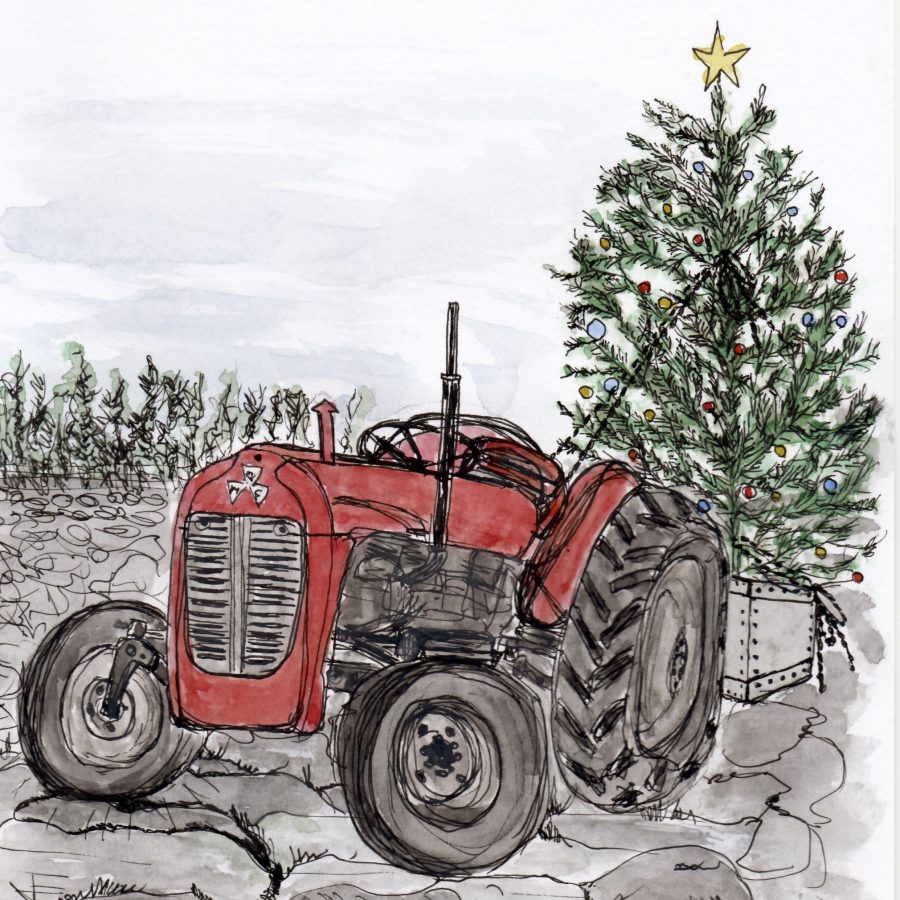Agricultural journalist, smallholder and Editor of the Ferguson Heritage Magazine Jane Brooks, joins us for her regular look at the world of agricultural machinery, with a focus on winter maintenance.
While you’re snug and warm beside a roaring fire, spare a thought for your tractor, locked away, safe, sound and secure in a shed, or at least you hope so. Tis the season to take proper care of your tractor otherwise, there could be a few nasty shocks in store for you.
Best to take action now before we get any snow, as who knows next time you come to use it or even drag it out of the shed in the spring you could be in for a shock, or even a cracked block.
To avoid breakdowns next here’s a simple checklist of some evasive action best taken in the not to-distant future:
Cosset your batteries
Cold weather will wreak havoc on dormant batteries. Over time, batteries begin to lose their charge, on old tractors it happens far more quickly than you expect. Do not let batteries completely drain of charge over the winter as freezing weather can completely kill empty batteries. Either check the battery every couple of weeks, or use the tractor. Also, if you are not using it and have a more modern machine it’s a good idea to detach the electronics and tech in your tractor, as they can slowly drain battery power too.
Stay warm
No, not you, the tractor, an open shed exposed to the elements may seem ok, but if it’s possible being stored in a frost proof, wind proof and burglar proof shed or barn is a good idea. As a last resort if you have no inside storage, in extreme conditions, you can also use a heavy, waterproof tarp. Antifreeze Check your anti-freeze you need a good strength one to last through winter, there are plenty on the market, use one to suit the lowest temperature you expect to get over the winter months, but don’t overdo it. Adding too much antifreeze can do some damage, so, follow the manufacturer’s instructions. You can use an antifreeze tester, to check the freeze point of the fluid in the system. On some older tractors it was recommended to change the fluid every 300 hours, with our classic tractors we go for a 50/50 mix.
Check the other fluids
While you’re checking the antifreeze, look at the tractor’s other bodily fluids, check transmission fluid levels, if you have one, the washer tank should be full. Also go around with a grease gun, make certain everywhere that needs fluid is at full capacity. This will stop condensation forming in empty spaces, which as well as watering down vital fluids can lead to freezing and damage to pipework.
Fuel maintenance
There is quite a difference between the winter treatment of diesel and petrol, here are the basics:
Diesel – Diesel engines need extra cold weather pampering, this is because the wax content in diesel reaches a gelling point if the temperature drops too low. This turns it into a jelly like mess and stops it from running through the fuel lines. If it gets too bad it can make the tractor completely unusable until the weather warms up toa temperature where it can be remixed.
Luckily an anti-gel additive is available and is generally added to fuel at source, which means that you will need to. switch to ‘winter fuel’ from your supplier. You can also purchase a separate additive to add to the tractors fuel tank from most motorist stores or agricultural dealers should you need it.
Petrol – If you’re planning to completely winterize petrol engine equipment, then drain the fuel. If unused petrol sits in the tank for months, it can become stale and gunk up components and cause problems starting the engine. Alternatively start the machine and run the engine for a few minutes several times a month.
Change the oil – A good time to change the oil in your tractor is before the weather turns cold. Any sediments that are in the oil can solidify over a cold winter, making them nearly impossible to flush out in the spring. A late autumn oil change will get rid of sediment and help to keep your tractor in fine fettle over the winter.
Take off the tech – If you do have GPS, drive your tractor into a dry space and take it off if the tractor is not going to be used over the winter, also remove detachable monitors, screens and devices in the tractor that can be taken off. Standing in cold weather isn’t good for delicate circuitboards and technology, nor is the damp, especially if it’s been freezing or snowing. Put the tech in a warm safe place, away from thieves, that way it won’t drain the battery or get damaged.
Pest control – Rodent control is difficult, preventative measures include natural predators, rodenticides, traps and electronic devices. If you’re storing your tractor and equipment somewhere like a barn, shed, or garage, have a good look around and if possible seal any spaces and holes that could allow easy entry for rodents. Block gaps in brickwork, check grates, drainage covers and vents. Remove food sources such as litter bins and debris, such as old paper, boxes etc., just generally keep the place tidy. We have some success with cats, although not all do a good job, we have one that prefers to nap on a tractor seat while watching her companions hard at work! Remember that farm cats should be neutered or spayed and fed to work at their best. Cats Protection have a scheme that will allow most smallholders and farmers to get their feral and farm colonies neutered for very low cost or even free.
This article originally appeared in the December 2023 edition of The Country Smallholder.
To receive regular copies of The Country Smallholder magazine featuring more articles like this, subscribe here.
For FREE updates from the world of smallholding, sign up for The Country Smallholder newsletter here.








